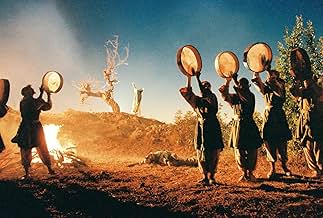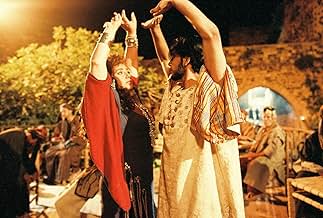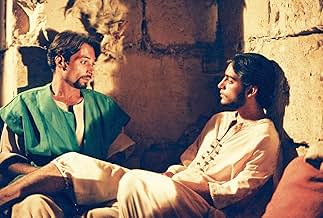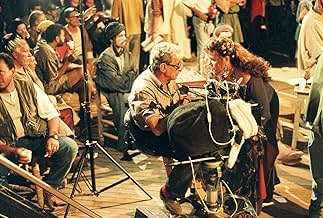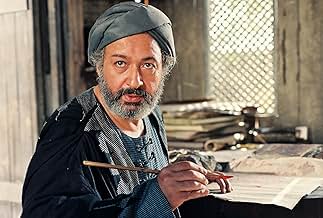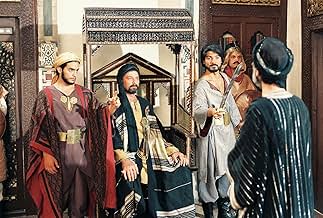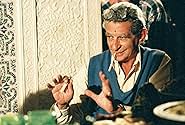The story is set in the 12th century in Arab-ruled Spanish province Andalusia, where famed philosopher Averroes is appointed grand judge by the caliph and his liberal court judgments are not... Read allThe story is set in the 12th century in Arab-ruled Spanish province Andalusia, where famed philosopher Averroes is appointed grand judge by the caliph and his liberal court judgments are not liked by everyone. The caliph's political rivals, centered around the leader of a fanatic... Read allThe story is set in the 12th century in Arab-ruled Spanish province Andalusia, where famed philosopher Averroes is appointed grand judge by the caliph and his liberal court judgments are not liked by everyone. The caliph's political rivals, centered around the leader of a fanatical Islamic sect, force the caliph to send Averroes into exile, but his ideas keep on livin... Read all
- Director
- Writers
- Stars
- Awards
- 2 wins & 1 nomination total
- Averroes
- (as Nour El Cherif)
- Al Mansour, The Caliph
- (as Mahmoud Hemeida)
- Averroes' Wife
- (as Safia El Emary)
- Nasser, The Crown Prince
- (as Khaled El Nabaoui)
- The Caliph's Brother
- (as Seif Abdel Rahman)
- Emir of the Sect
- (as Magdi Idris)
- Gaafar
- (as Hasan El-Adl)
- Director
- Writers
- All cast & crew
- Production, box office & more at IMDbPro
Featured reviews
The film had a great deal of technique and style. Although the film is set in the past, the language of the script is in colloquial Arabic, which is spoken on the streets of Egypt at this point in time. Making delivering the content of the words more important than giving the audience a believable setting. Aside from being a historical representation it was a philosophical thought on religion, society and politics. Some of the obvious themes in the film were as follows. The freedom of thought expressed in the power of the written and spoken word as a form of representation of the people, what they stand for, and their sufferings. In addition to the self and social destruction caused by ones political motivation hidden behind a religious façade.
Finally the film brings great memory of Francois Truffaut's `Fahrenheit 451'-. In making the point that one can burn all the books in the world, but that would never take what is in the books away from the people, because true words, weather written or memorized, are humanities memory and being till the end of time. Both films complement each other, one can darlingly view, `Al-Massir' as the beginning of a time that was elaborately explored in `Fahrenheit 451.' Both films had the same ending, in which the books were burnt and the words were kept in the memory of the people, independent of what the present political power did. The words of scholars, philosophers and story tellers live forever.
That was Al Massir, or the Destiny of Youssef Chahine. After his previous movie "El Mohager", Chahine was taken to court by a fundamentalist lawyer who claimed that Chahine presented the prophet Joseph in this movie and this is something forbidden "To show prophets on the screen" by Al Azhar. The lawyer wanted the court to stop showing the movie on the Egyptian screens as well as its distribution outside Egypt.
Regardless of the final conclusion of the court, this case was the major motive behind the script of "Al Massir". Jo (Chahine) wanted to send a clear message to this people "You can never stop ideas from reaching the people, neither by burning the books (last scene of the movie), nor by forbidding movies, etc....' As usual, Averoes in this movie was Chahine himself. Trying to keep a good balance between what the history says about Averoes and what Chahine wanted to reflect on this character, he chose his characters to include all the contradictions he wanted to show. Politics, philosophy, love, integrism, etc.... they are everywhere. This idea of combining Islam with Terrorism bothers Chahine, that is why he started the movie with the french religious authorities burning a man who "Translated the books of this Averoes", so don't you be surprised when Muslims burn "Only" the books of Averoes. This analysis of Chahine is what really makes the movie special. It was expected after what happened to him in his last movie (as I said in the beginning), he could have just make it a good reason for a movie showing Muslims as Terrorists, an easy way to attract a Western spectator. But Jo chose the hard way to do it, showing that among all this terrorism, people are still "Life lovers" as mentioned by the first song. These people who just love their life were those fighting against terrorist - not with weapons - but with love. "We have to know first why they are doing this', said Averoes. Actors were really good specially Nour Elsherif, Mahmoud Hemeida, Khaled Elnabawi and Ahmed Fouad Selim. Mohamed Mounir is as usual the voice of Chahine singing "Sing out loud, we still can sing".
Did you know
- TriviaAccording to an interview actor Nour El-Sherif stated that the role of Ibn Roshd was supposed to be played by director Youssef Chahine himself, but Nour told him that he was not suitable for the role.
- Quotes
Caliph's brother: Thoughts have wings. No one can prevent them from flying.
- ConnectionsFeatured in Humbert Balsan, producteur rebelle (2006)
- SoundtracksAlli sotak
and "Gamr el Hawa", words by Sameh El Kodoussi and Kawssar Mostapha, music by Kamal El Tawil
Performed by Mohamed Mounir
- How long is Destiny?Powered by Alexa
Details
- Release date
- Countries of origin
- Languages
- Also known as
- Destiny
- Filming locations
- Krak des Chevaliers, Syria(sect training grounds)
- Production companies
- See more company credits at IMDbPro
Contribute to this page


